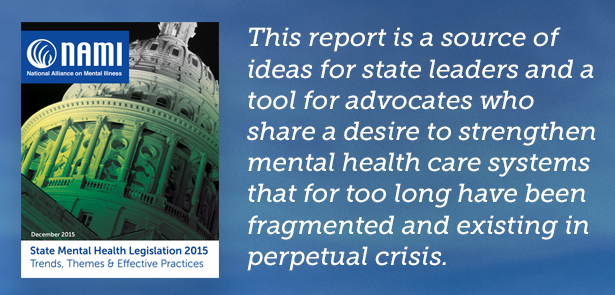NAMI’s report, State Mental Health Legislation: Trends, Themes and Effective Practices, highlights the good and bad news in states’ approaches to mental health.
The good news is that in 2015, 35 states adopted one or more measures that NAMI applauds with a Gold Star—and five states passed model legislation.
The bad news is that, at a time when public awareness of the need for mental health reform continues to increase, funding for mental health services fell in more states than it grew. This is the third year in a row the number of states willing to increase spending on mental health shrank.
The report also highlights legislation that helps improve mental health systems or services. Five bills stood out:
- AZ HB 2488 (Housing). Housing is a cornerstone of recovery for people with mental illness, yet, on average, the rent for a studio apartment rent exceeds 90% of disability income. This legislation creates a housing trust fund for rental assistance to people with serious mental illness.
- MN SF 1458 (First Episode Psychosis program). Leading research shows that early intervention through First Episode Psychosis (FEP) programs enables young people to manage psychosis and get on with their lives. This legislation supplements federal dollars to support evidence-based FEP programs.
- UT HB 348 (Criminal Justice and Mental Health). People with mental illness who would be better served with mental health services and supports too often end up in jails and prisons. This legislation requires the state departments of corrections and mental health to collaborate on providing mental health treatment to inmates, developing alternatives to incarceration and implementing graduated sanctions and incentives.
- VA HB 2118 (Psychiatric Inpatient Beds). Finding a psychiatric bed in a crisis is challenging. As a result, people with mental illness are often boarded in emergency departments for exceptionally long periods. Lack of information on the availability of psychiatric beds throughout a state is often part of the problem. This legislation requires all public and private facilities to report psychiatric inpatient and crisis stabilization beds at least once daily.
- WA SB 5175 (Telehealth). Nationwide, there is an acute shortage of mental health professionals. Telehealth can make mental health expertise more available to underserved communities using readily available technology. However, challenges in reimbursement have resulted in underuse of this valuable resource. This legislation defines telemedicine as a reimbursable service for the purposes of diagnosis, consultation or treatment.
Please follow the link and check out the report for yourself.
http://www.nami.org/statereport

 RSS Feed
RSS Feed